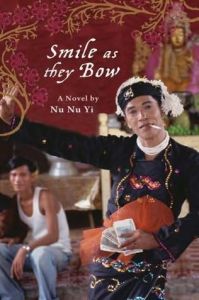Essay: J.M. McDermott on Smile As They Bow by Nu Nu Yi
From: Bull Spec #10
— Essay by J.M. McDermott —
There is a book that fantasy fans would probably love called Smile As They Bow by Nu Nu Yi. It might as well be a fantasy landscape to suburban Americans. Rural Burma, empty of familiar signs and signifiers, is home to old, local religions celebrating ancestor ghosts, called “Nats”. Elaborate festivals take place like an utterly foreign Mardi Gras. The priests of this religion are transvestites who are considered the best at dancing and praying and communing with the spirit world. The novel occurs over the week of the annual festival, and is about the troubled love affair of a sixty-something transvestite priestess named Daisy Bond and her much younger man, Min, bought for a moderate sum from his family when he was still just a teenager. The troubled, destructive relationship rolls to an end against the backdrop of the festival in all it’s gorgeous glory and abandon. The dancing until the wee hours, and the carousing among old friends and rivals in the gay community would feel familiar to us even as the ceremony is so alien to be indistinguishable from fictive invention to those unfamiliar with this aspect of Burmese culture, like me.
There are three things I love:
First, the characters are so terrifically unhappy. They are gloriously unhappy, dancing and shouting for joy and in prayer while the interior monologues reveal the insecurities of a culture that devours the weakness at the edge of a facade. The whole operation is a scam to Daisy Bond and most of the other elders, but it is a profitable one where the transvestites can be respected instead of reviled and jailed. Their sexuality is celebrated when they are mediums of the faith. They get to dance, wear elaborate clothes, openly fall in love, and still this tenuous place has so much heartache. The faithful that come to buy blessings are no different, putting on a strong face but crumbling inside, slowly, a year at a time.
Second, I love the utterly non-Western notion of POV. In a culture less-reliant on the individual, the narrative drifts casually into and out of any head, sometimes in the same paragraph. It is not confusing, rather a contribution to the disorientation if the feast. This simple thing, where all souls speak at once, makes me, as a reader, feel like I am the Nat dancing in the street, listening to my faithful’s wishes and passing judgment on their true, compassionate, fragile selves instead of the hard face shouting and haggling and saying horrible things.
Third, I love that such a simple narrative arc is present, without any flash or explosions or real resolutions. The book is true to its place, where one’s position is society is nearly immutable. Imposing impossible arcs, where things change dramatically would not be true to the book’s message and themes of a book that offers a glimpse into a world where everyone has a part to play, and no one can escape it. The glimpses into the past, and the future witnessed in the drug-addled and impoverished old transvestite alone in the poorest areas paint a clear picture of life and death for beautiful, passionate men, and all the people whose prayers are stuffed into their turbans and carried into the temple of the ancestral gods.
Smile As They Bow by Nu Nu Yi is a glorious little book. I hope you get a chance to check it out.
ABOUT THE ESSAYIST

J. M. McDermott is the author of six novels and two short story collections including the critically-acclaimed Dogsland trilogy, and Women and Monsters. He lives in San Antonio, TX.

